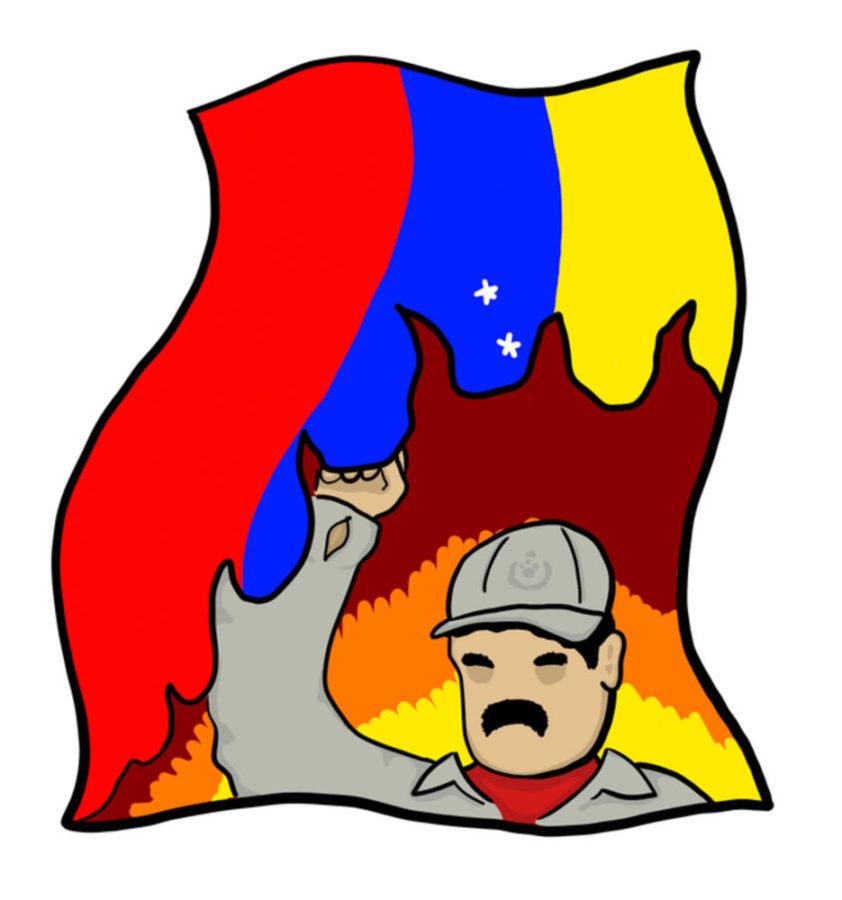The streets are filled with protesters. The shelves at grocery stores are empty, and pockets are even emptier.
Right now, Venezuela looks bleak — and Veronica, a Venezuelan immigrant living in Pittsburgh who requested that her last name be withheld for her family’s safety, said the country is feeling the effects.
“The feeling is just being deeply hopeless,” she said. “Demonstrations have left people killed, families in pain. After everything, they don’t have anything to treat their injuries. Because there are no medicines and the hospitals don’t have any resources, people are dying of common, treatable infections and injuries and there is no help.”
She told me about the dire situation her family currently faces in Venezuela under President Nicolas Maduro. Venezuela was once a praiseworthy example of a democratic government, but now the country is headed toward a dictatorship. President Maduro has brought the downfall of Venezuela — and the only solution may be to bring the downfall of the Maduro government.
In order to understand why Venezuela faces the crisis it does today, you must understand President Hugo Chavez’s actions between 1999 and 2013. While in office, Chavez was far more popular than Maduro ever has been — in fact, Chavez’s approval rating rarely dipped below 50 percent, while Maduro’s currently sits below 25 percent. Chavez blamed the country’s elite for economic inequality in a charismatic populist message, and won the support of Venezuela’s poor.
And between 2004 and 2007, Venezuela was successful — the price per barrel of oil rose from $40 to $80. For a country whose export profits consist of 95 percent oil, this was a huge deal. Chavez spent billions on public works projects like food subsidies, education funding and a health care program that was widely accessible. He became a high-powered representative for the previously disenfranchised population of Venezuela.
But when Chavez died and Maduro took office in 2014, oil prices crashed dramatically. With countries like China and Russia slowing down oil consumption due to economic recessions, major oil-producing nations like the United States and Canada began producing more oil to make up the lost profits. This created a surplus in the market and drove prices down — inflation in Venezuela rose, and the programs that citizens came to depend upon lost funding.
Vox reports Maduro took advantage of the rising inflation and set the official exchange rate at 10 bolivar per U.S. dollar, but only gave his closest allies access to this official rate. Maduro limited citizens’ access to the official market, forcing them to trade U.S. dollars on the black market at a rate of 12,163 bolivar per U.S. dollar — which cut citizens’ purchasing power to one-one-thousandth of the government’s.
Today, the country has the highest inflation in the world at 741 percent, a GDP which fell 35 percent in the past five years and a murder rate among the highest in the world.
Maduro also banned the majority of independent newspapers, and in 2014 the people of Venezuela started to turn against Maduro en masse. In response, Maduro decided to abolish Congress and stage an election to write a new constitution, despite the fact that 85 percent of the population opposed a new constitution.
And the government’s growing instability has real, everyday effects on average Venezuelans. President Donald Trump addressed the crisis in early August saying that sanctions and a “military option” will not be ruled out. Trump’s “military option” would mean that the United States would go into Venezuela to fight against the Maduro government. During the United Nations General Assembly on Monday, Trump again announced his attention toward the crisis in Venezuela, this time only saying the United States was prepared to take further action.
Several people criticized Trump’s “military option,” saying the invasion of Venezuela’s sovereignty would be a steep violation of international law. Venezuelan Defense Minister Vladimir Padrino even said, “as Minister of Defense and as a citizen I say this is a crazy act, an act of supreme extremism.”
Even when Maduro attempted to call Trump, the White House released a statement saying, “President Trump will gladly speak with the leader of Venezuela as soon as democracy is restored in that country.” But tensions are rising — Maduro called Trump “the new Hitler” in response to Trump’s statement at the U.N.
But while leaders are divided over the best course of action, Venezuelans like Veronica have made up their minds.
“I don’t see anything that can be done, unless it is foreign intervention,” she said. “The situation is so bad that no one has the capacity to fix it … voting or performing any social demonstrations have left people killed, families in pain.”
Although Trump may simply be making empty threats about the possibility of military intervention, it may be the only possible option. The sanctions the United States put on Venezuela haven’t been enough to end the suffering of the Venezuelan people, and won’t be in the future.
Sanctions merely harm the victims of an already corrupt system — now is the time for the United States and other international allies to aid Venezuela, bring an end to the Maduro government and begin to help Venezuelans rebuild stability in the country. Change will only come when the international community looks at the root of the crisis and understands how to combat Maduro and his tyrannical regime.
Saket primarily writes about justice, international news and politics. Write to Saket at [email protected].



